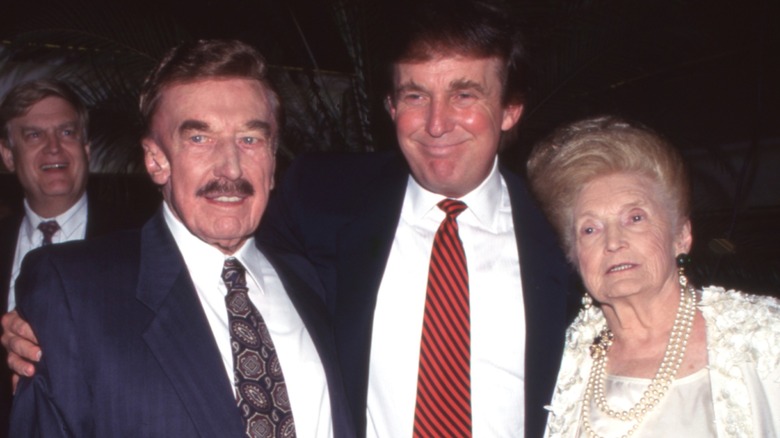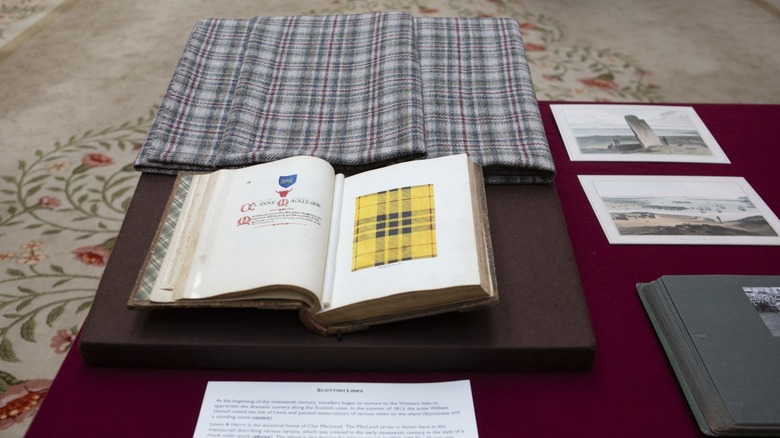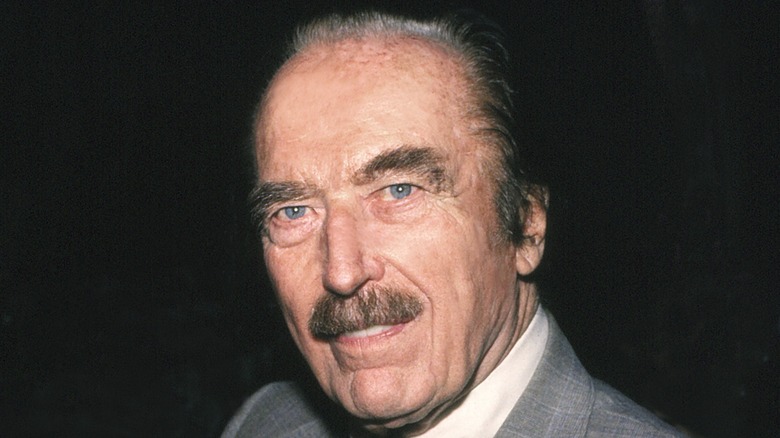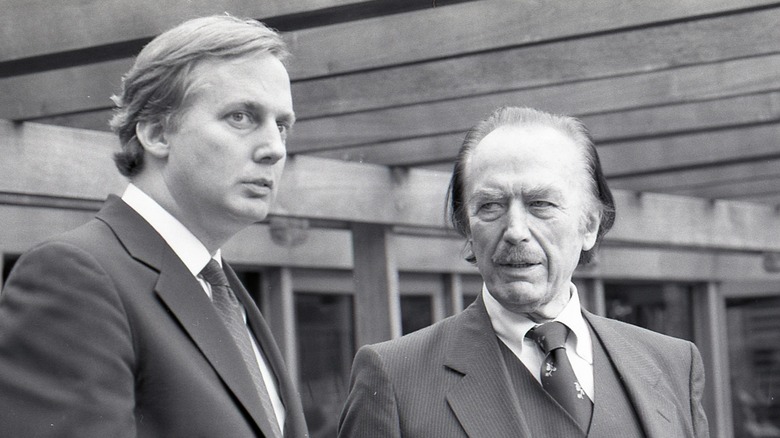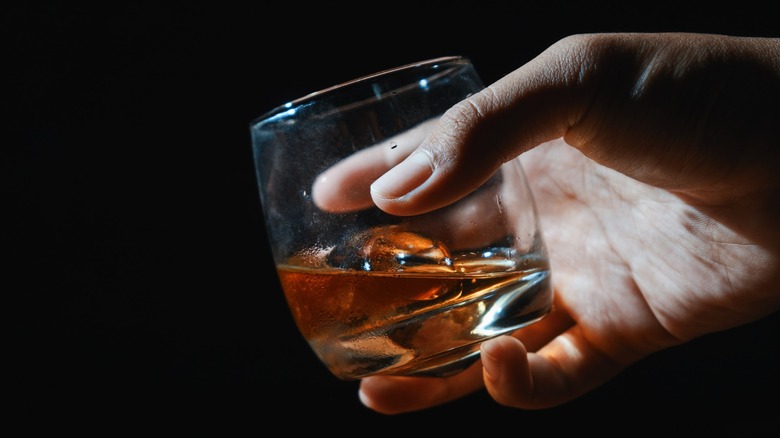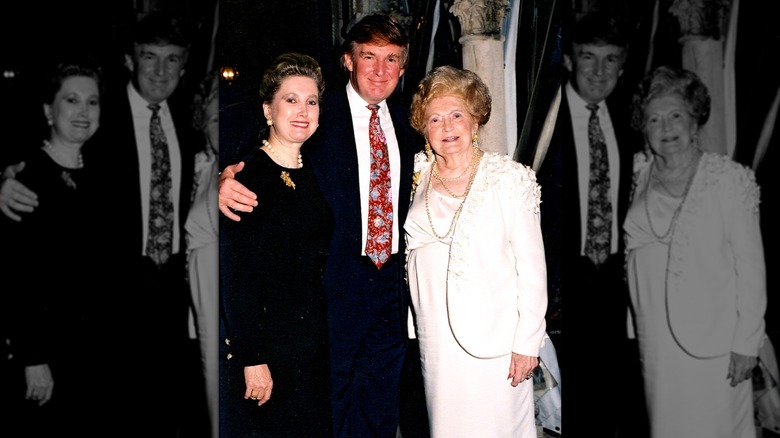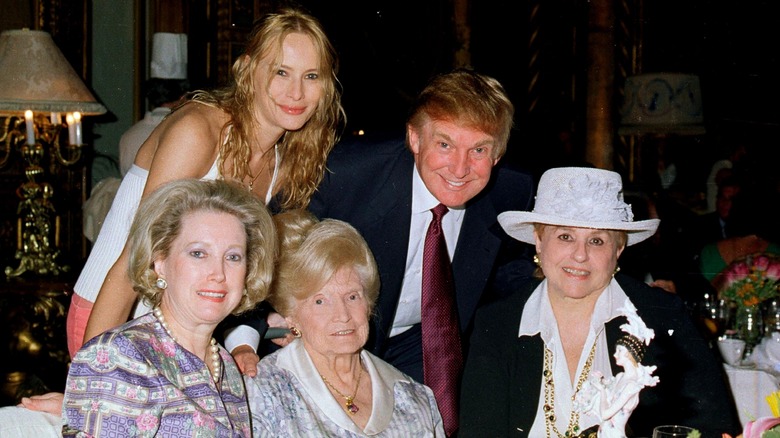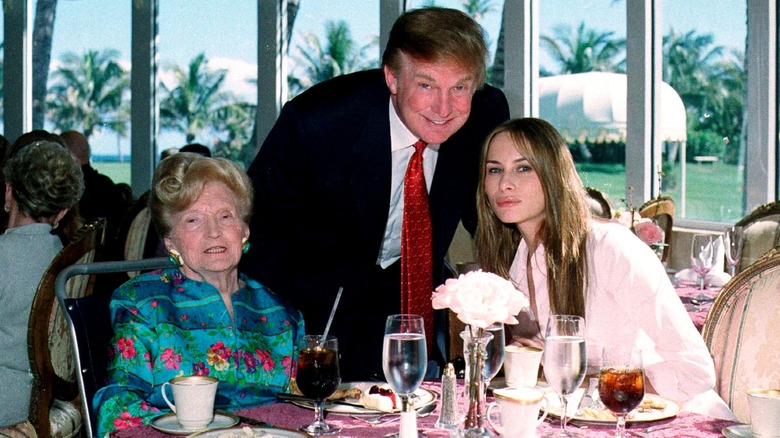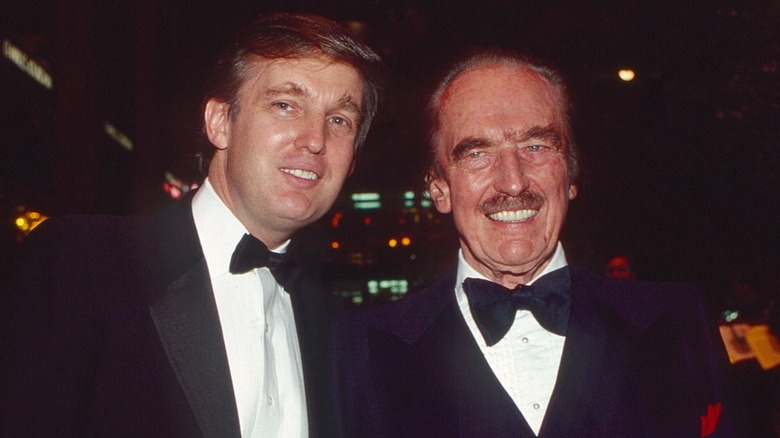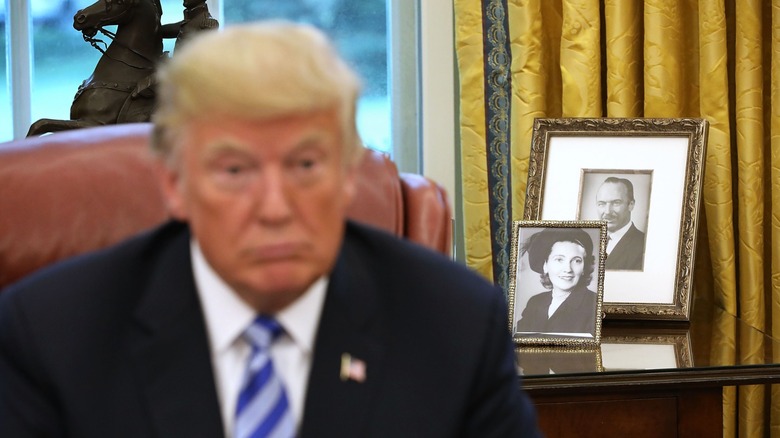Tragic Details About Donald Trump's Parents
"The most important influence on me, growing up, was my father, Fred Trump Sr. I learned a lot from him," Donald Trump wrote in "The Art of the Deal." "I learned about toughness in a very tough business, I learned about motivating people, and I learned about competence and efficiency: get in, get it done, get it done right, and get out." But it wasn't just Fred who influenced Donald. His mother, Mary Anne MacLeod Trump, did too. Heck, Donald even used her Bible when he was sworn in as president in 2025. In the aforementioned book, Donald notes that he has his mother's "showmanship." If Donald's MAGA military parade is anything to go by, she must have been quite the showwoman.
But Donald's parents didn't just impart "Diary of a CEO"-esque advice and hand-me-down religious texts. The many tragedies in their lives influenced a president in the making. From a life-changing mugging to family fatalities, these are the difficulties that Donald Trump's parents had to go through.
Donald Trump's mother left Scotland to escape economic hardship
It hasn't always been gold skyscrapers and private jets for the Trumps, and that goes double for Mary Anne MacLeod Trump. Donald's mother was born on the remote Isle of Lewis in 1912, far from the bright lights and big city of New York. Bill Lawson, a genealogist who has traced the Trump family tree back to the 19th century, believes that Mary's father was a business owner who ran a shop and post office (per the BBC). We didn't realize the family business went that far back! Although Mary's family are said to have been more financially stable than the other townsfolk, that hardly made them millionaires.
Back then, the island was not the idyllic tourist destination it has become. The repercussions of World War I had devastated the island. 1,000 islanders lost their lives, and a shipwreck killed over 200 sailors returning from war on New Year's Eve in 1919. The result: a scarcity of eligible husbands and some serious economic hardship. So Mary, alongside many like-minded young women, left the Scottish island and fled to the States in search of a better life. Unfortunately, Mary's story would get worse before it got better.
Mary Anne MacLeod Trump was dirt-poor during her first five years in America
An apocryphal tale, peddled by Donald Trump no less, suggests that Mary Anne MacLeod Trump met his father, Fred Trump Sr., while on holiday in the US. However, it was far from a vacation. In reality, Mary arrived in the Big Apple with just $50 to her name and quickly snapped up work as a "domestic" (via Politico). It was an occupation Mary would have for at least four years. During this time, she was 5,000 miles from home, but she wasn't a million miles away from the high-society socialite she'd later become.
Mary stayed with her sister Catherine Reid, who had fled Scotland after giving birth out of wedlock, on Long Island. But she got a glimpse at how the other half lived, as Mary worked "with a wealthy family in a big house in the suburbs of New York." But she didn't just work for any wealthy family; she worked for the Carnegies. Yes, those Carnegies. Mary was a maid for the widow of Andrew Carnegie, the Scottish steel tycoon and American dream made manifest, at their 64-room mansion. Despite not being a Trump yet, in quite a Trumpian way, Mary found herself among the rich and famous whilst being near-penniless herself.
Fred Trump Sr.'s father died when he was very young
If there's one material synonymous with Donald Trump, it's gold. It's something that must run in the family, as Donald's grandfather, Frederich Trump, made his money in the Alaska gold rush. Sadly, the future president never got to meet him. After arriving in the States from Germany in 1885, Frederich quickly became a successful businessman. But in 1918, Frederich passed away from pneumonia, and Fred Trump Sr. was just 13 years old when his father died.
A father's death is tough at any point in life, but especially in childhood. In Fred's case, he became a workaholic. He even made his children, Donald included, watch him work. Not exactly the behavior of someone well-adjusted to fatherhood. But since Frederich was not around for a majority of his adolescence (when the emotional part of the brain develops), it's understandable.
Such fatherless children are shot into life and forced to invent and forge their own path, a character type the author Malcolm Gladwell terms "eminent orphans" (via NPR). It's a term that describes Fred Trump Sr. to a T...
Fred Trump Sr. had to grow up very fast
Fredrich Trump's death left a young Fred Trump Sr. without a father, and his mother, Elizabeth Trump, without a husband. But it left them both strapped for cash. Ever the businessman, Fred persevered by earning 11 cents from selling newspapers at high school. He also moonlighted as a golf caddy and a delivery boy, all to help with the single-parent family finances. Fred's young life is a classic case of "parentification," referring to "when parents de facto delegated parenting roles to children" (per The Guardian).
Parentification can have many negative effects when the child becomes a parent themselves, such as the inability to provide a loving family dynamic. "Parentification was related to Machiavellianism, a trait of manipulativeness, callousness, and indifference to morality," researchers writing in the Youth and Children's Services Review found. "The experience of parentification could jeopardize a child's ability to subsequently provide parental warmth." This certainly was the case for Fred. "As [Donald Trump's] father has pointed out over and over again, most people are weaklings," wrote Gwenda Blair, the author of "The Trumps: Three Generations of Builders and a Presidential Candidate" (via Yahoo! News). "Only the strong survive. You have to be a killer if you want to be a king." Words Donald heeded, but tragically, it was advice his elder sibling Fred Trump Jr. couldn't live up to.
Their son, Fred Trump Jr., struggled with alcoholism and died at age 42
The tragic death of Donald Trump's brother, Fred Trump Jr., was as heartbreaking as it was preventable. Fred Sr. saw it as Jr.'s destiny to take over the family business. Instead, Fred Jr. became the sensitive black sheep of the family. "Fred wanted his oldest son to be a 'killer', in his parlance, and [Fred Jr.] was temperamentally the opposite of that," wrote Mary Trump in her book "Too Much and Never Enough" (via News.com.au). "Freddy's problem was his failure to be a different person entirely."
Fred Jr. harbored dreams of being a pilot. "I do regret having put pressure on him," Donald told The Washington Post in 2019. "[The family business] was just not his thing ... I think the mistake that we made was we assumed that everybody would like it ... There was sort of a double pressure put on him."
In his 20s and 30s, alcoholism destroyed Fred Jr.'s life. He went from a married airline pilot with two children named after his parents to a divorcee living with his parents. He died from a heart attack in 1981 at age 42. Donald gave an insight into how it affected him. "[Fred Jr.] had a profound impact on my life, because you never know where you're going to end up," Donald told People. "I've known so many people that were so strong and so powerful [yet] they were unable to stop drinking."
During her final pregnancy, Mary Anne MacLeod Trump needed emergency treatment
By 1948, Mary Anne MacLeod Trump had all but completed her rags-to-riches arc. She met Fred Trump Sr., someone she later called "the most eligible bachelor in New York," at a dance in Queens in the mid-1930s (via American Heritage). They married within the year and had five children. However, when Mary was pregnant with the late Robert Trump, the birth almost ended in tragedy.
Mary suffered severe hemorrhaging, which meant she had to undergo an emergency hysterectomy. Sadly, the hysterectomy led to yet more surgery. "Four [surgeries] in something like two weeks," Maryanne Trump Barry recalled to the aforementioned Gwenda Blair (via Politico).
"My father came home and told me she wasn't expected to live," continued Maryanne, revealing just how ruthless Fred could be as a father. "[B]ut I should go to school and he'd call me if anything changed. That's right — go to school as usual!" Thankfully, Mary lived. However, the Trump family tragedies didn't end there.
Mary Anne MacLeod Trump's grandson suggests she was an outsider in her own family
"For years, people on my grandfather's side of the family would bury the true story of my grandmother's arrival in America," wrote Fred Trump III, Donald Trump's nephew, in his book "All in the Family: The Trumps and How We Got This Way" (via the Stornoway Gazette). "The way they chose to tell the story, Scottish lass Mary Anne was 'on holiday' from her happy life across the ocean when she met her Prince Charming, conveniently skipping the part where she fled grinding poverty and the five years she had worked as a maid in Queens and in Long Island in other people's homes."
This false narrative, shared by Donald himself, has been regurgitated by reputable news outlets like the BBC and even a Trump biographer. Fred III claims that this made Mary feel "like an outsider in her own family."
A mugging gave Mary Anne MacLeod Trump a brain hemorrhage
Mary Anne MacLeod Trump was hard to miss in New York. The matriarch of the Trump clan was known for driving around in a Rolls-Royce with her "MMT" initials on the vanity plate (via Politico). In 1991 , moments after stepping out of her vehicle, she was accosted by a teenage mugger who grabbed her purse and threw her against the sidewalk. Mary suffered a brain hemorrhage and loss of vision. The only money in her purse was $14, but the effects were life-altering.
Thankfully, some justice was served. The mugger failed to get away with his measly swag because bread van driver Lawrence Herbert waylaid him until the police arrived. The 16-year-old was subsequently sentenced to three to nine years in the clink. To put a silver lining on the tragic event, Donald Trump later met with Herbert, who was working three jobs to stop the bank foreclosing on his home, and they dined at the incredibly lavish Trump-owned Plaza Hotel. Later, Herbert was offered a job by Donald and given a check with enough money for him to keep his home.
The tragedy also had a profound effect on Donald and his future politics. "[I]n my family we believe in going the extra mile," he wrote regarding the incident in his book "The America We Deserve" (via Yahoo! News), stating his view on how the justice system should work. "The Trumps believe in getting even."
Fred Trump Sr. suffered from dementia and Alzheimer's in later life
Tragically, dementia and Alzheimer's run in the Trump family. Fred Trump III shed light on how the disease affected his grandfather in the 1980s. "Some of the similar stories you've heard time and time again, that when his limousine would stop, he would just get out of the car and start walking away," Fred III recalled to People. "You know, things that you almost say, 'Oh, there goes grandpa again.'"
However, while the disease took hold, Fred Sr. remained ever the businessman. "He still went to work every day — that was part of the thing," said Fred III. But Fred Sr. didn't necessarily head to the office for work; it was to give his wife a break. "My grandmother used to call it the 36-hour day, being around my grandfather."
As it's glaringly obvious Donald's health seems to be in decline, he is, as ever, keen to rewrite the history books. His 2025 presidential campaign dismissed any suggestion of his deteriorating mental state as "fake news," after his nephew claimed the non-consecutive president could go the same way as his father. "I've seen [Donald's] decline. But I see it in parallel with the way my grandfather's decline was," Fred III explained. "If anyone wants to believe that dementia did not run in the Trump family, it's just not true."
While Fred Trump Sr.'s mental state declined, his family were fighting over his will
When Fred Trump Sr.'s mental state had declined so far that he could not even remember his birthday, Donald Trump's mind was on business. Donald, who was facing personal bankruptcy, pressured him into cutting Fred Trump Jr.'s children out of the will. Thus, Fred III and Mary Trump, who have a complicated relationship themselves, filed lawsuits. Tragically, Donald was creating grudges that would last long after Fred Sr.'s death.
In response to legal action, Donald cut essential around-the-clock medical care for Fred III's chronically disabled child. "This was worse than anything else I could possibly imagine," Fred III said of the ordeal in his aforementioned 2024 book (via The Conversation). "Which, I suppose was the point." It was a family beef that rumbled on into 2022, when Donald defeated Mary's 2020 lawsuit over the inheritance.
Donald allegedly took advantage of his father. "As demonstrated by his willingness to alter his father's will illicitly and in secret, there are no limits to Donald's unethical behavior," said Mary to The Washington Post. "[Donald] had no compunction about deceiving his father in order to defraud his own siblings. There is no code of conduct, no moral or ethical imperative that stands in the way of Donald's craven willingness to achieve his ends no matter the means." This was a sordid and avoidable tragedy that impacted the Trumps for a generation.
